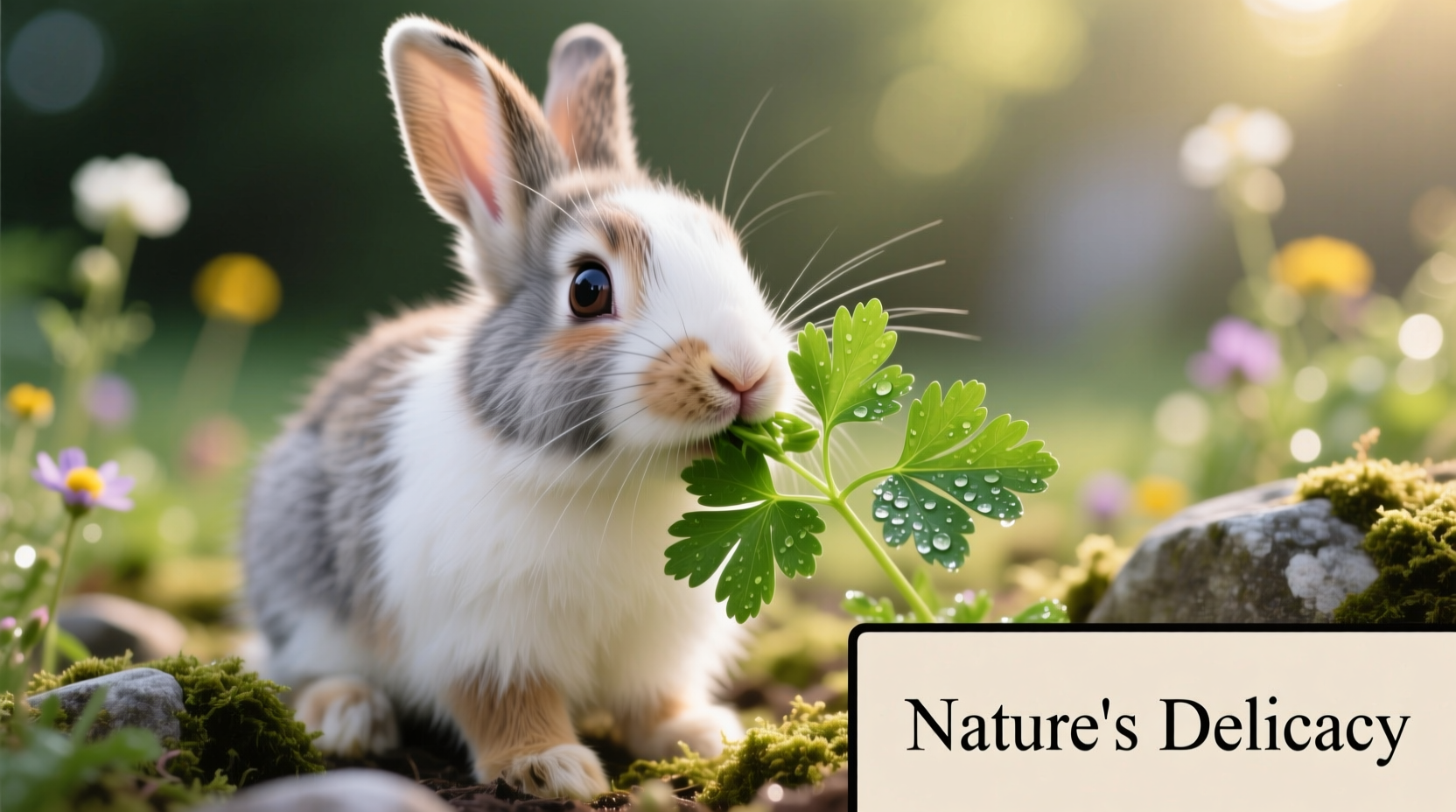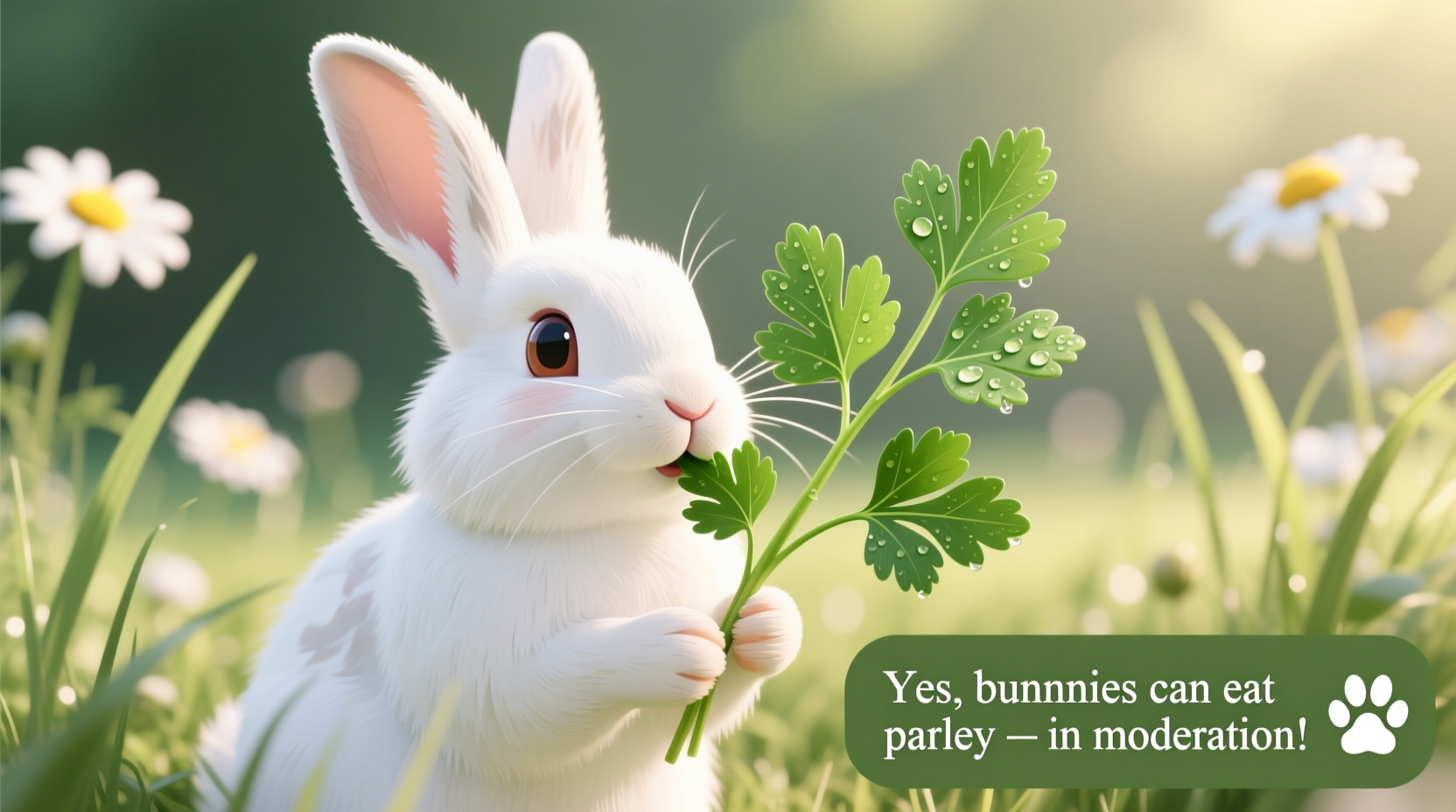Yes, bunnies can safely eat parsley in moderation as part of a balanced diet, but excessive consumption may cause urinary issues due to its high oxalate content. Adult rabbits should receive no more than 1-2 sprigs 2-3 times weekly, while baby rabbits under 12 weeks should avoid it completely.
As a rabbit owner, you want to provide the best nutrition for your furry companion while avoiding potentially harmful foods. Understanding which herbs are safe—and in what quantities—is crucial for maintaining your bunny's long-term health. This comprehensive guide delivers veterinarian-backed information about incorporating parsley into your rabbit's diet safely and effectively.
Why Parsley Matters in Rabbit Nutrition
Parsley isn't just a decorative garnish—it contains essential nutrients that benefit rabbits when fed appropriately. This leafy green provides vitamins A, C, and K, plus important minerals like calcium and iron. However, its nutritional profile also includes compounds that require careful portion control.

Understanding Parsley's Nutritional Composition
Rabbits have sensitive digestive systems that require specific dietary balance. Parsley contains approximately 1.7% calcium and 1.3% oxalates by dry weight, according to research published in the Journal of Animal Physiology and Animal Nutrition. While calcium supports bone health, excessive amounts combined with oxalates can contribute to urinary tract issues in susceptible rabbits.
| Nutrient | Parsley (per 100g) | Safe Daily Limit for Adult Rabbit |
|---|---|---|
| Calcium | 138mg | 200-300mg total from all greens |
| Oxalates | 1.3g | Limit high-oxalate greens to 2-3x/week |
| Vitamin A | 421μg | No specific limit (essential nutrient) |
| Fiber | 2.8g | Part of 2-3 cups daily mixed greens |
Benefits of Parsley for Bunnies
When fed in appropriate amounts, parsley offers several health advantages:
- Hydration boost: With 87% water content, parsley helps maintain proper hydration
- Dental health: The fibrous texture promotes natural tooth wear
- Vitamin support: Rich in vitamin K for blood clotting and vitamin C for immune function
- Dietary variety: Introducing different safe greens prevents nutritional deficiencies
Important Context Boundaries for Feeding Parsley
Not all rabbits should consume parsley, and certain conditions require special consideration. The House Rabbit Society recommends avoiding parsley for rabbits with:
- History of urinary sludge or stones
- Kidney disease
- Calcium metabolism disorders
- Baby rabbits under 12 weeks of age
For healthy adult rabbits, parsley should constitute no more than 15% of their daily leafy green intake. Always introduce new foods gradually over 2-3 weeks while monitoring for digestive changes.
Practical Feeding Guidelines You Can Implement Today
Follow these veterinarian-approved steps to safely incorporate parsley into your rabbit's diet:
- Start small: Offer one small leaf to test tolerance
- Wash thoroughly: Remove pesticides and contaminants using a vegetable wash solution
- Remove stems: Feed only the leafy portions, as stems contain higher oxalate concentrations
- Monitor reaction: Watch for 24 hours for signs of digestive upset
- Gradual increase: If well-tolerated, slowly increase to appropriate portion size over 2 weeks
For an average 5-pound adult rabbit, the appropriate serving is 1-2 sprigs (about 1 tablespoon chopped) 2-3 times weekly. Always combine with other low-calcium greens like cilantro, basil, or mint to maintain dietary balance.
Recognizing Potential Problems
While parsley is generally safe when fed properly, watch for these warning signs that indicate you should discontinue feeding:
- Decreased urine output or straining to urinate
- Cloudy or thickened urine
- Reduced appetite or lethargy
- Diarrhea or unusually soft cecotropes
If you notice any of these symptoms, remove parsley from the diet immediately and consult your exotic veterinarian. The Merck Veterinary Manual emphasizes that early intervention is critical for urinary issues in rabbits.
Your Rabbit's Complete Dietary Framework
Parsley should never dominate your rabbit's diet. Remember the proper nutritional balance:
- 80%: Unlimited grass hay (timothy, orchard, or meadow)
- 10%: Fresh leafy greens (including parsley in moderation)
- 5%: High-fiber pellets
- 5%: Occasional healthy treats
This balanced approach prevents nutritional imbalances while providing dietary variety that keeps your bunny interested in eating.
When to Consult Your Veterinarian
Always consult an exotic veterinarian before making significant dietary changes, especially if your rabbit has pre-existing health conditions. Seek immediate veterinary attention if you notice:
- Complete loss of appetite lasting more than 12 hours
- Blood in urine
- Significant weight loss
- Painful vocalizations while moving
The American Association of Rabbit Veterinarians recommends annual check-ups for all pet rabbits to catch potential issues before they become serious.











 浙公网安备
33010002000092号
浙公网安备
33010002000092号 浙B2-20120091-4
浙B2-20120091-4